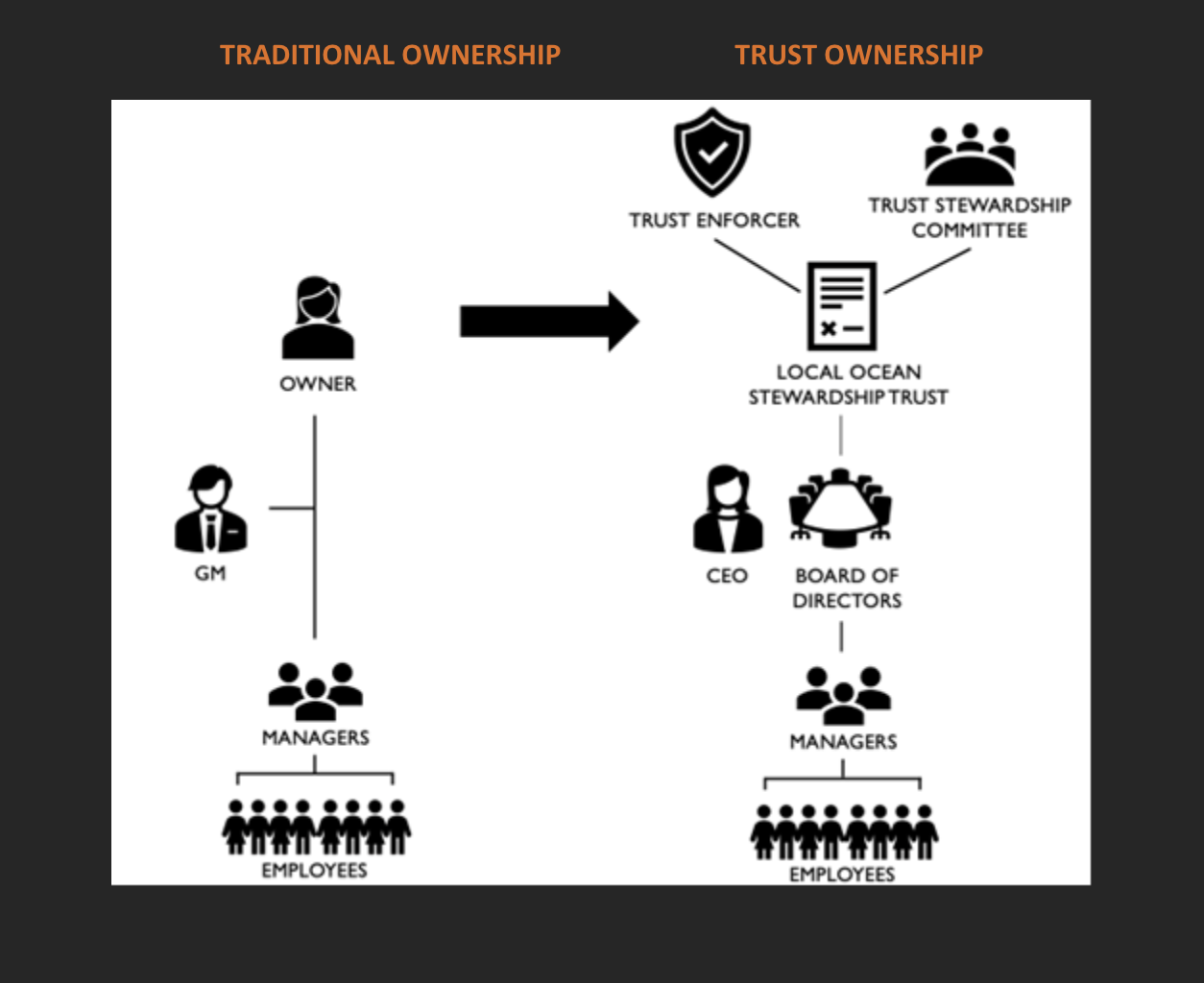What is Trust ownership and how does a Trust run a business?
In traditional business ownership, an individual or group of individuals owns the company’s stock. This gives them the power to direct the company as well as benefit from the company’s profits. They may keep the profits as personal earnings, or they may reinvest in the business for continued improvement. They also may sell the company or close the company.
A Perpetual Purpose Trust is a type of trust which exists to advance a purpose. These types of trusts can be set up to hold the ownership of a company in perpetuity to allow it to continue to serve a purpose through its operations. Unlike traditional ownership, the trust owns the company’s stock. Therefore, all profits are reinvested in the business as dictated by the trust.
An Employee Ownership Trust is the name used for a Perpetual Purpose Trust created for the purpose of providing ongoing benefit the employees of the company. Since the trust owns the shares of the company, strictly-speaking this isn’t “employee ownership” in the literal definition of the term, but is considered a form of employee ownership given the motivations and results of the purpose.
The Local Ocean Stewardship Trust, a type of Perpetual Purpose Trust, provides legal framework to ensure that the profits generated by the company are specifically and strategically reinvested to achieve Local Ocean’s purpose.
At the end of the day, Local Ocean is still a normal company. An employee’s role can be as simple as being hired and doing their job. Or, employees can opt to be involved at a higher level by participating in governance, namely through electing representatives to and/or participating in the Trust Stewardship Committee.
What’s the Purpose of the Local Ocean Stewardship Trust?
PURPOSE STATEMENT
The Purpose is the compass for both the Board of Directors and the Trust Stewardship Committee to ensure the company stays on course and true to its mission and values.
“The purpose of this trust is to be the long-term steward of Local Ocean Seafoods, Inc.”
These objectives advance the Purpose of the Trust. This is the heart and soul of Local Ocean:
For our employees:
Operate the Company for the benefit of all existing employees.
Prioritize a profit-sharing program or some equivalent financial program that fairly and equally distributes meaningful patronage to existing employee-owners.
Promote engagement of stakeholders in governance of the Trust and the Company.
Provide a great place to work for everybody, where people want to come to work in a culture that values employee voices, and their personal and professional development.
For our fishers and community:
Ensure supply chain decisions prioritize sustainable seafood, local seafood, and direct purchases from fishers.
Provide market opportunity for the local fishing fleet and showcase local seafood species and products.
Advocate for Oregon fisheries, fishers, and the Pacific Ocean through education, philanthropy, and partnerships with values-aligned entities in the local and global community.
For our customers:
Ensure consistent and exceptional product and service standards are maintained; from product receiving, to product preparation, to plating and presentation.
Maintain Company premises and equipment to ensure a safe, sanitary, well-kept, and aesthetically pleasing environment.
Exemplify environmental, social, and economic sustainability in business practices.
For Local Ocean
Ensure financial security for the long-term viability of the Company.
Practice transparency with all Stakeholders of the Company through open-book management principles.
The Objectives are embedded in the Trust Agreement and are therefore intended to be locked in for perpetuity. They can be revised only by a unanimous vote of the TSC and Trust Enforcer.
How is a trust-owned company governed without a person as the owner?
Trust GOVERNANCE
The Trust Agreement outlines the roles required to govern the trust. Since no one individual person owns the company stock, these roles are required to ensure the company operates in accordance with the trust Purpose and Objectives:
Trust Stewardship Committee - Ensures the company is operating in service of the Purpose and Stakeholders.
Administrative Trustee - Files Annual Report and taxes and reports on any disbursements.
Trust Enforcer - Steps in to resolve grievances should any arise.
Company Governance
Additionally, it is required that the Company, Local Ocean Seafoods, establish corporate officers, including a President/CEO and Secretary. Local Ocean has further established a Board of Directors to oversee and direct all company operations. The BOD includes the CEO, Founder, 2-3 Managers (who represent Operations, Sales, and Finance), and potentially up to 2 At Large (non-employee) members.
REPORTING REQUIREMENTS
“Annual Purpose Metrics” are key measures whereby the TSC can determine if the company is on track and making progress toward the purpose. Following TSC and Board review, the Annual Purpose Metrics must be shared in full with the employees.
PROFIT SHARING
The profit-sharing program is determined and distributed annually by the Board and may change annually to meet the company’s goals and Purpose of the Trust. In determining the annual budget, the Board will estimate a meaningful profit distribution for the end of the year. However, monetary distribution depends on actual profits earned and is not guaranteed.
Any active or inactive/lapsed employee who worked during the fiscal year may qualify for profit-sharing, so long as they have:
• Tenure (cumulative): 6 months OR 1,000 hours worked
• Good Standing: Currently employed OR left on good terms (eligible for rehire)
2023 PROFIT SHARE MODEL CALCULATION
The philosophy of this model is to recognize that 1) all job roles are essential to the company’s success, and that 2) normal compensation based primarily on role, skill, and performance, therefore 3) individuals should be rewarded for their commitment as determined by total hours worked during the fiscal year (capped at maximum 2080 hours) and cumulative tenure in years (capped at maximum 10 years). Tenure is emphasized with a 5% multiplier.
Hours Worked x (1+[Tenure (years) x 0.05]) = Employee’s Points
[Profit Pool / Sum of All Points] x Employee’s Points = Employee’s Profit Share
Still want to learn more or want to talk about how to find out if your company is a good candidate for trust ownership?
These are the pros who helped us through it all:


